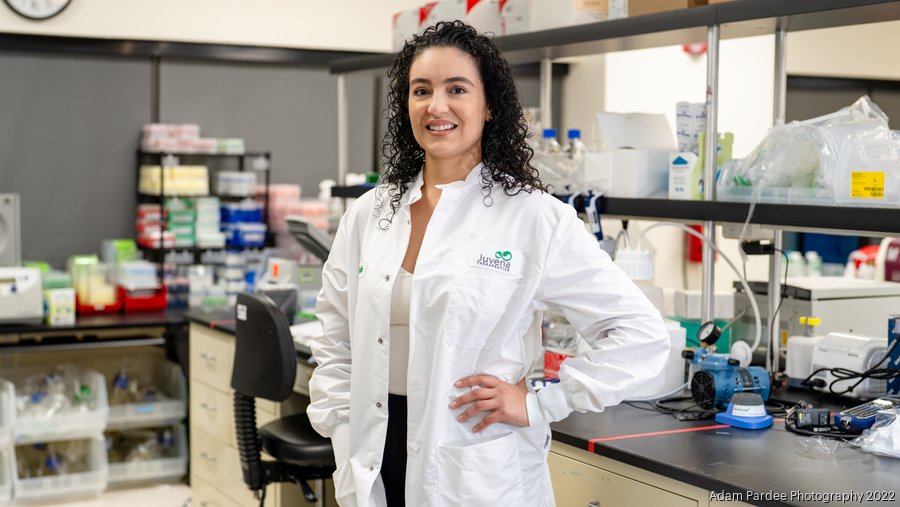From the San Francisco Business Times.
For Hanadie Yousef, the inspiration for pushing Juvena Therapeutics’ aging-related drug toward its first clinical trial is never far away.
Her father, Anwar Yousef, grew up in a United Nations-administered refugee camp in Jordan. He taught himself English and escaped war and poverty by earning one of two scholarships in Jordan awarded by the British Council, a nondepartmental public body sponsored by the government, to Oxford University.
After finishing his undergraduate degree, he returned to Jordan where he reconnected with a woman he had tutored in math when they were teenagers eight years before. He was heading back to London for a new job and he and Shukria Yousef, who grew up on the West Bank and had spent time in a refugee camp, got engaged.
They moved together to the United Kingdom, then Egypt, where he worked for the British government and Arab League on a Suez Canal-related project, and finally the United States. He earned his Ph.D. in computer engineering from Columbia University, worked for General Motors Corp. in Ohio and Indiana, General Electric Co. in Boston and a computer hardware company while the couple raised six children, including Hanadie.
The takeaway: Education is a portal to opportunity, and Anwar and Shukria, who was a math teacher, pushed their children to seize those moments.
“Never take ‘No’ for an answer, and be OK with risk,” Hanadie Yousef added. “Lifelong learning is just going to open so many doors.”
Anwar died in April 2021, at the age of 72, from a stroke. He had suffered from multiple conditions, including diabetes, kidney issues and cardiovascular disease.
“He would joke that he’s Juvena’s first patient,” Yousef said. “He was my biggest champion, and that’s definitely something that moves me.”
Youssef parlayed classes at Carnegie Mellon University, where she majored in chemistry, into a growing list of experiences: an undergraduate research post at the University of Pittsburgh Medical Center, internships at Regeneron Pharmaceuticals Inc. and Genentech Inc., a graduate student teaching job at the University of California, Berkeley, and a postdoctoral fellowship in the Stanford University lab of Tony Wyss-Coray.
But it was after she took a course by UC Berkeley professors Irina Conboy and Mike Conboy that she focused on the emerging field of aging biology. By August 2017, she and Jeremy O’Connell started Juvena, incubating it through the StartX program at Stanford.
O’Connell remains Juvena’s chief scientific officer while Yousef is the CEO of the 30-employee company, now based in Redwood City. It has raised $60 million to date from angel investors — including Jeff Dean, who helped design and implement many aspects of Google’s services — the National Institutes of Health and a $3.9 million grant in early 2022 from the semipublic California Institute for Regenerative Medicine.
By focusing on creating therapeutics from proteins secreted by stem cells, Juvena hopes to treat a range of muscle and metabolic diseases, including diabetes. Its first drug, called JUV-161, in November received orphan drug designation from the Food and Drug Administration as a potential treatment for myotonic dystrophy type 1, or DM1.
The FDA designation for diseases affecting fewer than 200,000 people promises a tax credit for research and extended marketing rights if the drug ultimately makes its way through the multiple stages of clinical trials and is approved by the FDA.
Muscle-wasting myotonic dystrophy is the most common form of the various muscular dystrophies among adults. It affects the central nervous system, causing muscle spasms or stiffening, and weakens the heart, eyes and gastrointestinal tract, ultimately leading to fatal complications.
It is a genetic disease that basically accelerates aging, worsening with each successive generation.
Injectable JUV-161 was a se-
creted protein screened by Juvena’s artificial intelligence-driven platform and engineered to bring out the therapeutic properties of a protein called IGF-2, or insulin-like growth factor 2, that plays a key role in growth and development before birth. The drug is meant to restore fiber formation, turn the tide of muscle atrophy, build muscle strength and endurance and improve metabolism.
“It restores tissue function and health,” Yousef said.
Juvena expects to start a clinical trial of JUV-161 in the second half of this year.
“We really want to go from bench to bedside and establish a pipeline of disease-modifying biologics to regenerate and repair tissue to treat many chronic diseases,” Yousef said.
With that, she said, Juvena could save many patients who, like her father, go from good health to chronic age-related diseases.
“This could really be something that reverses how we approach health care,” Yousef said, “and ensures health care for loves ones with natural therapies instead of invasive surgeries or symptom management.”
